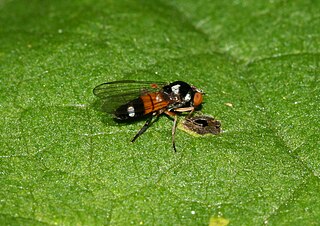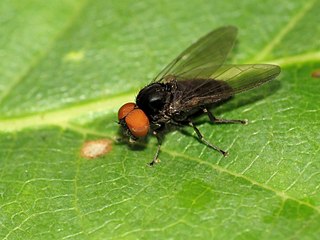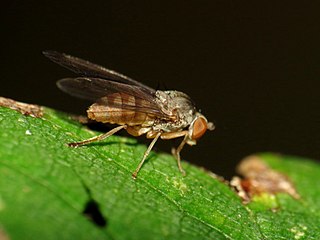
The Platypezoidea are a superfamily of true flies of the section Aschiza. Their closest living relatives are the Syrphoidea, which, for example, contain the hoverflies. Like these, the adults do not burst open their pupal cases with a ptilinum when hatching, thus the Aschiza do not have the inverted-U-shaped suture above the antennae. They are, however, muscomorphs, thus have a particular type of pupal case resembling a rounded barrel and called puparium.
George Henry Verrall was a British horse racing official, entomologist, botanist and Conservative politician.

Platypezidae is a family of true flies of the superfamily Platypezoidea. The more than 250 species are found worldwide primarily in woodland habitats. A common name is flat-footed flies, but this is also used for the closely related Opetiidae which were included in the Platypezidae in former times.

The Opetiidae or flat-footed flies are members of a family of flies. The family contains only five extant species in two genera, Opetia, and Puyehuemyia. the remaining taxa are known only from fossils.

Episyrphus balteatus, sometimes called the marmalade hoverfly, is a relatively small hoverfly (9–12 mm) of the Syrphidae family, widespread throughout the Palaearctic region, which covers Europe, North Asia, and North Africa. The upper side of the abdomen is patterned with orange and black bands. Two further identification characters are the presence of secondary black bands on the third and fourth dorsal plates and faint greyish longitudinal stripes on the thorax. Its color patterns may appear wasp-like to other animals, such as birds, protecting it from predation.

Caliprobola is a genus of Hoverflies, from the family Syrphidae, in the order Diptera.
Ironomyiidae is a small family of flies in the order Diptera. Historically, they had been included in the family Platypezidae, and includes three extant species and a number of extinct fossil species.

Callomyia is a genus of flies in the family Platypezidae. Some species can be found in Belgium.

Polyporivora is a genus of flat-footed flies. There are about eight described species in Polyporivora.

Platypeza is a genus of flat-footed flies. There are at least 30 described species in Platypeza.
Seri is a genus of flat-footed flies in the family Platypezidae.
Metaclythia is a genus of flat-footed flies. There is one described species, Metaclythia currani.

Platypeza consobrina is a species of flat-footed flies in the family Platypezidae.
Chydaeopeza is a genus of flat-footed flies. There is one described species, Chydaeopeza tibialis.

Agathomyia is a genus of flat-footed flies in the family Platypezidae.
Platypezina is a genus of flat-footed flies in the family Platypezidae.
Microsania is a genus of flat-footed flies in the family Platypezidae.

Protoclythia rufa is a species of flat-footed flies in the family Platypezidae.
Pamelamyia is a genus of flat-footed flies. There is one described species, Pamelamyia stuckenbergorum.

Paraplatypeza is a genus of flat-footed flies in the family Platypezidae.











